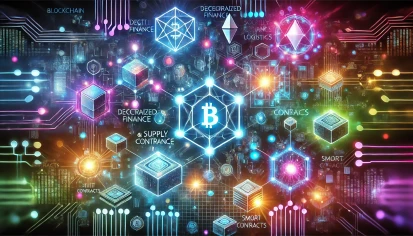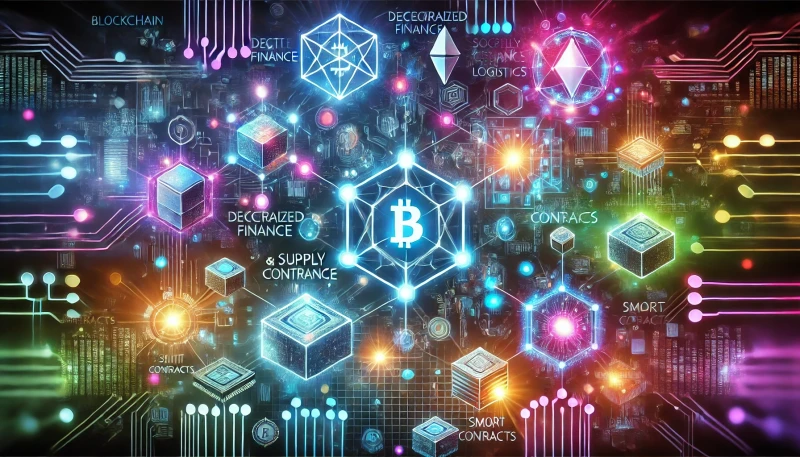Decentralized Finance (DeFi): Redefining Financial Services
In recent years, the financial world has witnessed the emergence of a new, innovative movement called Decentralized Finance (DeFi). Built on blockchain technology, DeFi aims to reshape the traditional financial system by offering open, permissionless, and transparent financial services without the need for banks or other intermediaries. DeFi represents a radical shift in how people interact with financial services, providing new opportunities for individuals to access loans, earn interest, and transfer assets in a decentralized and efficient manner.
What is Decentralized Finance (DeFi)?
Decentralized Finance, or DeFi, refers to a set of financial services that are built on decentralized blockchain networks. Unlike traditional finance, which relies on centralized institutions such as banks, DeFi operates using smart contracts, which are self-executing contracts that automatically carry out actions when certain conditions are met. This eliminates the need for intermediaries and allows users to access a wide range of financial services directly from their digital wallets.
DeFi platforms are typically built on the Ethereum blockchain, which provides the infrastructure for creating and executing smart contracts. By leveraging blockchain technology, DeFi aims to create an open and inclusive financial ecosystem where anyone with an internet connection can participate, regardless of their location or financial background.
How DeFi is Redefining Financial Services
Decentralized Finance is transforming the financial industry by providing new ways for individuals to interact with financial products and services. Here are some of the key ways in which DeFi is redefining financial services:
1. Decentralized Lending and Borrowing
One of the most popular use cases of DeFi is decentralized lending and borrowing. Traditional lending requires borrowers to go through banks or other financial institutions, which often involves lengthy approval processes and credit checks. DeFi platforms, on the other hand, allow users to borrow and lend funds directly without intermediaries.
Through DeFi lending platforms like Aave and Compound, users can earn interest on their digital assets by lending them to others. Borrowers can also access loans by providing collateral in the form of cryptocurrency. The entire process is automated using smart contracts, which ensures that funds are distributed securely and transparently without the need for manual intervention.
2. Yield Farming and Liquidity Provision
Yield farming is another innovative concept introduced by DeFi. Yield farming allows users to earn rewards by providing liquidity to DeFi protocols. In traditional finance, providing liquidity to banks or financial institutions typically offers low returns. However, in the DeFi space, users can earn significant rewards by staking their assets in liquidity pools.
Platforms like Uniswap and SushiSwap offer decentralized exchanges where users can provide liquidity to trading pairs. In return, they receive a portion of the transaction fees generated by the exchange. Yield farming and liquidity provision have become popular ways for crypto holders to earn passive income while contributing to the liquidity of decentralized platforms.
3. Decentralized Exchanges (DEXs)
Decentralized exchanges (DEXs) are platforms that allow users to trade cryptocurrencies directly with one another without relying on a centralized intermediary. Traditional cryptocurrency exchanges, such as Binance or Coinbase, act as intermediaries that facilitate trades and hold users' funds in custody. In contrast, DEXs like Uniswap and PancakeSwap allow users to trade directly from their wallets, ensuring that they retain full control over their funds.
DEXs provide a more secure and private way to trade cryptocurrencies, as users do not need to create accounts or go through lengthy verification processes. By eliminating the need for intermediaries, DEXs reduce the risk of hacks, fraud, and censorship, providing users with a more transparent and open trading experience.
4. Stablecoins and Financial Inclusion
DeFi has also introduced stablecoins, which are cryptocurrencies that are pegged to the value of a stable asset, such as the US dollar. Stablecoins like USDC and DAI provide a stable store of value in the volatile world of cryptocurrencies, making it easier for individuals to use them for everyday transactions.
Stablecoins play a crucial role in promoting financial inclusion, as they allow individuals in regions with unstable currencies or limited access to banking services to participate in the global financial system. By providing a stable and accessible digital currency, DeFi is helping to bridge the gap between the unbanked population and the financial services they need.
Benefits of Decentralized Finance
Decentralized Finance offers several benefits that make it an attractive alternative to traditional financial services:
- Accessibility: DeFi is open to anyone with an internet connection, regardless of their location or financial background. This makes financial services more accessible to underserved populations, including those who do not have access to traditional banks.
- Transparency: All transactions on DeFi platforms are recorded on the blockchain, making them transparent and auditable. This level of transparency helps build trust among users and ensures that all activities are conducted fairly.
- Lower Costs: By eliminating intermediaries, DeFi reduces the costs associated with financial transactions. Users can save on fees typically charged by banks, brokers, and other financial institutions.
- Security: DeFi platforms use blockchain technology and smart contracts to provide secure and tamper-proof financial services. Users retain full control over their funds, reducing the risk of hacks and fraud.
- Passive Income Opportunities: DeFi offers various opportunities for users to earn passive income, such as yield farming, staking, and providing liquidity. These opportunities allow users to put their digital assets to work and generate returns.
Challenges Facing DeFi
While DeFi holds great promise for the future of finance, it is not without its challenges. Some of the key challenges facing DeFi include:
- Regulatory Uncertainty: The regulatory environment for DeFi is still evolving, and there is uncertainty regarding how DeFi platforms will be regulated. Governments and regulatory bodies are exploring ways to address issues related to compliance, consumer protection, and taxation in the DeFi space.
- Smart Contract Vulnerabilities: DeFi platforms rely on smart contracts to automate financial transactions. However, smart contracts are not immune to bugs or vulnerabilities, which can be exploited by hackers. Security audits and rigorous testing are essential to ensure the safety of DeFi protocols.
- Scalability: Most DeFi platforms are built on the Ethereum blockchain, which has faced scalability issues due to high demand. Network congestion and high gas fees can make DeFi transactions slow and expensive, limiting the accessibility of these services to a broader audience.
- User Education: DeFi is a relatively new concept, and many users may not fully understand how it works or the risks involved. Education is crucial to ensure that users can make informed decisions and protect themselves from potential risks.
The Future of Decentralized Finance
The future of Decentralized Finance looks incredibly promising, with ongoing advancements aimed at making DeFi more accessible, secure, and efficient. As blockchain technology continues to evolve, we can expect to see improvements in scalability, user experience, and regulatory clarity, which will help DeFi reach a broader audience.
One area of development is the integration of Layer 2 scaling solutions, which aim to address the scalability issues faced by DeFi platforms. Layer 2 solutions, such as Optimism and Arbitrum, help reduce transaction costs and improve the speed of DeFi transactions by processing them off the main Ethereum chain. This will make DeFi services more affordable and accessible to users around the world.
Another key development is the rise of cross-chain interoperability, which allows DeFi platforms to operate across multiple blockchain networks. By enabling different blockchains to communicate with one another, cross-chain interoperability will increase the flexibility and functionality of DeFi platforms, allowing users to access a wider range of assets and services.
As the DeFi ecosystem continues to grow, we are also likely to see greater collaboration between traditional financial institutions and DeFi platforms. Banks and other financial institutions are beginning to recognize the potential of DeFi to enhance their services and improve financial inclusion. By embracing DeFi, traditional finance can benefit from the transparency, efficiency, and accessibility that decentralized systems offer.
Conclusion
Decentralized Finance (DeFi) is redefining the financial services industry by offering open, permissionless, and transparent alternatives to traditional financial products. From lending and borrowing to decentralized exchanges and yield farming, DeFi provides a wide range of opportunities for individuals to participate in the financial ecosystem without the need for intermediaries.
While challenges remain, the benefits of DeFi are too significant to ignore. As technology continues to evolve and regulatory clarity improves, DeFi has the potential to create a more inclusive and efficient financial system that benefits people around the world. By leveraging blockchain technology and smart contracts, DeFi is paving the way for a new era of finance—one that is open, transparent, and accessible to all.


